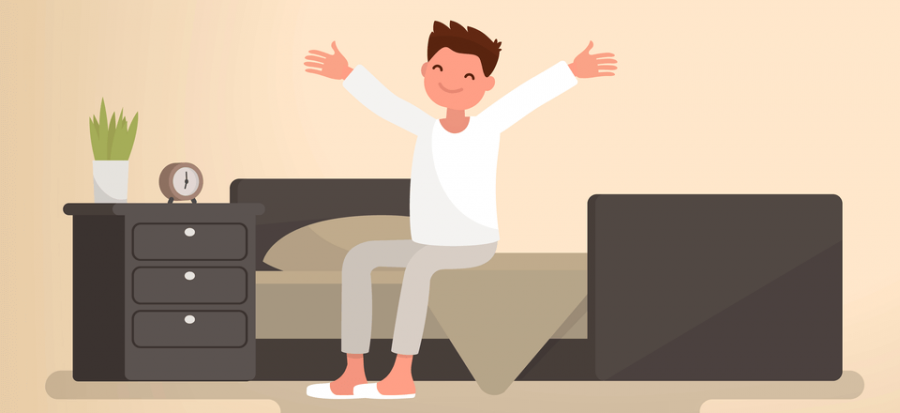Why You Should Wake Up Early — And How
May 7, 2020
The sixteen years of life that I have lived through are enough to realize that I have the most disgusting habits in the world. I honestly do not have the guts to list all of them in public like this due to severe embarrassment, but some are necessary for the continuation of this article. They include procrastination and an awful sleep cycle. And when I mean awful, I mean awful; I honestly pity the state that my circadian rhythm is in. On weekends, I go to sleep at around 8:00 in the morning. On weekdays where I am forced to wake up for Zoom calls, I wake up at the same time. It always seems like morning people have their lives more together than us night people, but I’ve always been like this; it’s just how I am built. I suspect a large number of Tenafly students are too, judging from people’s Snapchat stories about how they hear birds chirping as they go to sleep.
I actually conducted a week-long experiment on my sleep schedule, where I went to bed between 9:00 and 10:00 p.m. and woke up between 6:00 and 7:00 a.m. each day. I suspect the details will bore you, but this is the overview: The first two days were excruciatingly painful. I tried to go to sleep earlier, at around 2:00 a.m. or 3:00 a.m, but waking up at 6:30 a.m. after that was just not good for my mental health. (I should’ve started out slower.) I still survived, and in my exhaustion, I fell asleep at 9:00 p.m. on day two and succeeded in completely reversing my sleep cycle. On day three, I happily woke up at around 6:00 a.m., thirty minutes before the ringing of my alarm. The triumph that I felt as the sun rose behind my window drove me to complete all of my chemistry and math homework for the day even before all of my friends grudgingly woke up at 8:29 a.m. to attend Zoom classes half asleep. This continued for the rest of the experiment week (until I ruined it all yesterday by having to complete my chemistry homework). You may not believe me, but it was the best week I had during the quarantine. For the rest of the article, I will explain why you should also try waking up early and how to.
The first reason is that it helps with your school life. It does improve your concentration significantly. On normal days, I would wake up five minutes before a Zoom meeting, attend half asleep, and wait at least half an hour to fully concentrate. After waking up earlier, I could actually be conscious enough to pay attention to the class for the first ten minutes since I was in the process of waking up two hours before the Zoom meeting. According to studies from The Business Insider, sleep inertia (the state between sleep-induced fog and full wakefulness) lasts anywhere from two to four hours. Also, I am so much more productive when I wake up early. I get time to eat a healthy breakfast and finish considerable amounts of my homework for the week when other people are sleeping! Thus, after Zoom classes end, I have so much more free time on my hands to enjoy the afternoon with my family and still be able to do my schoolwork.
Another reason is that it increases satisfaction and happiness. I know from personal experience that so many students can relate to this. You fall asleep at 4:00 a.m., wake up at 8:30 a.m. for Zoom calls exhausted, and take a four-hour nap in the afternoon while the sun is out and your entire family is awake and having fun. After you wake up, because you were sleeping, you got no homework done and have all the energy in the world. You do your homework and fall asleep at 4:00 a.m. again, and the cycle continues. You miss the sunlight coming through your windows. You miss so much of the perfect blue sky and the nice spring breeze. Most of the time when you’re awake, you’re staring out into the pitch-black night sky. The simple solution is waking up earlier. In addition, according to The Business Insider, early risers were less affected by negative thoughts than later risers were.
Okay, fine. You might now be considering waking up early. But will you actually? Probably not, because you have a busy life (even during quarantine) and it takes too much pain and effort to do this. Here are some tips that I’ve learned from my own experience and some research:
The first tip is to start slow. I made this mistake when I completely switched my sleep schedule a full 180 degrees, and it was probably really bad for my health. The first day, set the alarm ten minutes earlier than usual. The second day, twenty minutes, and so on. This way, it takes basically zero effort and you can still feel like you are in the process of accomplishing something (which you are!)
The second tip is to make a written list. It doesn’t need to be all pretty and colorful. You can literally take a piece of scrap from the trash can, scribble with a Sharpie your goals of when to wake up, and tape it in your room where it’s visible. I found it helpful to write down my progress and to constantly have a visual reminder of what to do.
The third tip is consistency. Weekends were the hardest part of this experiment. Despite my instinct telling me that the thought of being out of my bed before noon is atrocious, I successfully survived Saturday and Sunday by waking up at the same exact time as the weekday. It actually created more free time too, which allowed me to enjoy the weekend to the fullest.
The fourth and last, which might be the most painful, is to get off your screen at least thirty minutes before sleeping. During the quarantine, we spend even more time on our screens because all of our assignments are online. (I think I spend more time staring at a screen than I spend sleeping.) I started to grab a book before going to bed instead of my phone to watch TikToks, and it’s actually not as bad as I expected.
So, I hope that I have convinced you a little bit to try waking up early for a few days. You might hate it, or you might unexpectedly love it. The only thing I have left to write is that the early bird gets the worm.


















































































































































